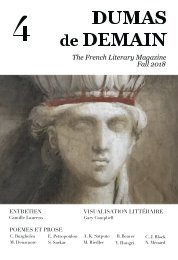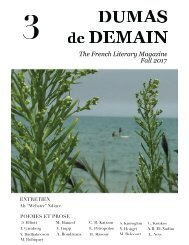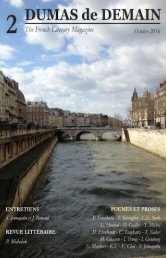Dumas de Demain: The French Literary Magazine Vol. 7
Create successful ePaper yourself
Turn your PDF publications into a flip-book with our unique Google optimized e-Paper software.
perspective of said animals, or people working and living with them,
and anticipate side effects of decisions based only on abstraction. I
believe that in our daily life we use both back and forth to make
decisions, understand situations, and navigate in space and time. Both
are necessary and often intermingled.
2. You write that “Kripke describes the system of reference and
naming that creates what he calls “rigid designators” as a
historical and collective process: ‘In general our reference depends
not just on what we think ourselves, but on other people in the
community, the history of how the name reached one, and things
like that.’” The act of naming and referencing is indeed a
significant historical and collective process. Do you believe there is
a way the system of reference and naming, the “rigid designators,”
can be made more flexible and dynamic to accommodate a rapidly
changing world?
I cannot answer for Saul Kripke! But I will try to answer according to
my limited lights. "Rigid designator" is a concept of analytic
philosophy that is applied mostly to proper names. Its definition in
the Stanford Encyclopedia of Philosophy is: "A rigid designator
designates the same object in all possible worlds in which that object
exists and never designates anything else." (LaPorte, Joseph, "Rigid
Designators", The Stanford Encyclopedia of Philosophy (Spring 2018
Edition), Edward N. Zalta (ed.), URL =
<https://plato.stanford.edu/archives/spr2018/entries/rigiddesignators/>.)
In this sense, a rigid designator cannot be made less
rigid, because rigidity doesn't depend on decision, choice, or
historical change: it is a trait of our system of signification and
reference, which allows us to identify individuals consistently. This
includes non-existent and fictional ones. I mention rigid designators
when I claim that studying the construction of adstracted beings such
as a lion in a fable adds nuances in our understanding of the way we
imagine or think about individuals. I don't take a position on the
philosophical usefulness of the concept of "rigid designator". Your
question raises a different set of issues that Kripke doesn't address, at
least not in Naming and Necessity. Can certain traits of natural
languages (such as the grammatical indication of gender) be at some
point modified to accommodate historical social changes (such as an
6 | DUMAS de DEMAIN









